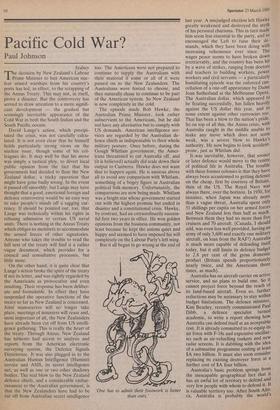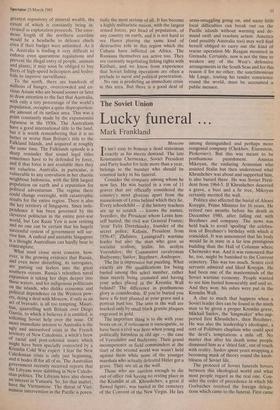Pacific Cold War?
Paul Johnson
Sydney The decision by New Zealand's Labour Prime Minister to ban American nuc- lear armed warships from his country's ports has led, in effect, to the scrapping of the Anzus Treaty. This may not, in itself, prove a disaster. But the controversy has served to draw attention to a more signifi- cant development — the gradual but seemingly inevitable appearance of the Cold War in both the South Indian and the South Pacific oceans.
David Lange's action, which precipi- tated the crisis, was not carefully calcu- lated. It is not even clear that he himself holds particularly strong views on the nuclear issue, though some of his col- leagues do. It may well be that his move was simply a tactical ploy, to divert local public opinion from the fact that his government had decided to float the New Zealand dollar, a tricky operation that might have gone badly wrong. In the event it passed off smoothly, but Lange may have thought that a good, emotional foreign and defence controversy would be an easy way to take people's minds off a sagging cur- rency. It should be pointed out, too, that Lange was technically within his rights in refusing admission to certain US naval units. There is nothing in the Anzus Treaty which obliges its members to accommodate the armed forces of other signatories. Anyone who takes the trouble to read the full text of the treaty will find it a rather vague document, which provides for a council and consultative processes, but little more.
On the other hand, it is quite clear that Lange's action broke the spirit of the treaty if not its letter, and was rightly regarded by the Americans as provocative and even insulting. Their response has been deliber- ate and formidable. In effect they have suspended the operative functions of the treaty so far as New Zealand is concerned. Joint manoeuvres will no longer take place, meetings of ministers will cease and, most important of all, the New Zealanders have already been cut off from US intelli- gence gathering. This is really the heart of the treaty. Through Anzus, New Zealand has hitherto had access to analysis and reports from the American electronic surveying system, the Defence Signals Directorate. It was also plugged in to the Australian Human Intelligence (Humint) service and ASIS, its secret intelligence net, as well as one or two other shadowy bodies. The real blow to the New Zealand defence chiefs, and a considerable embar- rassment to the Australian government, is that the New Zealanders have had to be cut off from Australian secret intelligence too. The Americans were not prepared to continue to supply the Australians with their material if some or all of it were ,passed on to the New Zealanders. The Australians were forced to choose, and they naturally chose to continue to be part of the American system. So New Zealand is now completely in, the cold.
The episode made Bob Hawke, the Australian Prime Minister, look rather subservient to the Americans, but he did not have any alternative but to comply with US demands. American intelligence ser- vices are regarded by the Australian de- fence chiefs as indispensable to their whole military posture. Once before, during the Gough Whitlam government, the Amer- icans threatened to cut Australia off, and (it is believed) actually did scale down their output to Canberra. Hawke does not want that to happen again. He is anxious above all to avoid any comparison with Whitlam, something of a bogey figure in Australian political folk-memory. Unfortunately, the comparisons are now being made. Whitlam was a bright star whose government started out with the highest promise but ended in disaster and a constitutional crisis. Hawke, by contrast, had an extraordinarily success- ful first two years in office. He won golden opinions from the business community, not least because he kept the unions quiet And happy and seemed to have imposed his will completely on the Labour Party's left wing.
But it all began to go wrong at the end of 'One has to admit their footwork than ours.' last year. A misjudged election left Hawke greatly weakened and destroyed the myth of his personal charisma. This in turn made him seem less essential to the party, and so encouraged the Left to raise their de- mands, which they have been doing with increasing vehemence ever since. The wages peace seems to have broken down irretrievably, and the country has been hit by a wave of strikes, ranging from doctors and teachers to building workers, power workers and civil servants — a particularly humiliating episode was the enforced can- cellation of a one-off appearance by Dame Joan Sutherland at the Melbourne Opera. The Australian dollar, which appeared to be floating successfully, has fallen heavily against the US dollar this year, and to some extent against other currencies too. That has been a blow to the nation's pride. So on top of all this, the Anzus crisis, with Australia caught in the middle unable to make any move which does not seem weak, was a severe blow to Hawke's authority. He now begins to look accident- prone, just as Whitlam did. It.was inevitable, however, that sooner or later defence would move to the centre of political life in Australia. The trouble with these former colonies is that they have always been accustomed to getting defence on the cheap, first by courtesy of Britain, then of the US. The Royal Navy was always there, over the horizon. In 1930, for instance, when Japan was already more than a vague threat, Australia spent only 51 shillings per capita on her armed forces and New Zealand less than half as much. Between them they had no more than five, cruisers and 70 aircraft. (Canada, I should add, was even less well provided, having an army of only 3,600 and exactly one military aircraft, on loan from the RAF!) Australia is much more capable of defending itself today, but it still limits its defence budget to 2.8 per cent of the gross domestic product (Britain spends proportionately nearly twice, and the Americans three times, as much). Australia has no aircraft carrier on active service, and no plans to build one. So it cannot project force beyond the reach of its land-based aircraft. Even so, further reductions may be necessary to stay within budget limitations. The defence minister, Kim Beazley, recently commissioned Paul Dibb, a defence specialist turned academic, to write a report showing how Australia can defend itself at an acceptable cost. It is already committed to re-equip its air force with F-18s and expensive ancillar- ies such as air-refuelling tankers and new radar screens. It is dabbling with the idea of a submarine programme costing at least $A two billion. It must also soon consider replacing its existing destroyer force at a further cost of $A four billion.
Australia's basic problem springs from the inescapable geographical fact that it has an awful lot of territory to defend and very few people with whom to defend it. It is valuable territory too. After South Afri- ca, Australia is probably the world's greatest repository of mineral wealth, the extent of which is constantly being in- creased as exploration proceeds. The enor- mous length of the northern coastline would be a headache to defence chiefs even if their budget were unlimited. As it is, Australia is finding it very difficult to enforce even quarantine regulations and prevent the illegal entry of people, animals and plants; it may soon be obliged to buy fleets of high-speed helicopters and hydro- foils to improve surveillance. To the north, there are hundreds of millions of hungry, overcrowded and en- vious Asians who are bound sooner or later to draw attention to the fact that Australia, with only a tiny percentage of the world's Population, occupies a quite disproportion- ate amount of its surface area. This was a point constantly made by the expansionist Japanese in the 1930s. The Australians have a good international title to the land, but it is worth remembering that it is no better or worse than Britain's title to the Falkland Islands, and acquired at roughly the same time. The Falklands episode is a sharp reminder that sound legal titles sometimes have to be defended by force, and if that force is not available then they are valueless. Australia, in particular, is vulnerable to any convulsion in her chaotic neighbour Indonesia, with the fifth largest Population on earth and a reputation for political adventurism. The regime there could change overnight, with catastrophic results for the entire region. There is also the key territory of Singapore. Since inde- pendence it has been governed by the cleverest politician in the entire post-war world, but Lee Kuan Yew is now retiring and no one can be certain that his hugely successful system of government will sur- vive him. A radical and unstable Singapore is a thought Australians can hardly bear to contemplate.
Whatmust cause most concern, how- ever, is the growing evidence that Russia, and even more disturbing, its surrogates, are putting out feelers into the great southern oceans. Russia's relentless naval expansion is taking her ships deeper into these waters, and for indigenous politicians on the islands, who dislike economic and political dependence on the Western pow- ers, doing a deal with Moscow, if only as an act of bravado, is all too tempting. Mauri- tius, quarrelling with Britain over Diego Garcia, to which it believes it is entitled, is soliciting Soviet help over the issue. Of more immediate interest to Australia is the ugly and unresolved crisis , in the French territory of New Caledonia, a witch's brew of racial and post-colonial issues which might have been specially concocted by a Kremlin Cold War expert. I fear the New Caledonian crisis is only just beginning, and it bodes ill for all of us. The Australian government recently received reports that the Libyans were dabbling in New Caledo- nian politics. The Libyans have also shown an interest in Vanuatu. So, for that matter, have the Vietnamese. The threat of Viet- namese intervention in the Pacific is poten-
tially the most serious of all. It has become a highly militaristic nation, with the largest armed forces, per head of population, of any country on earth, and it is not hard to see Hanoi playing the same kind of destructive role in this region which the Cubans have inflicted on Africa. The Russians themselves are active too. They are currently negotiating fishing rights with Kiribati, and we know from experience that Soviet fishing operations are often a prelude to naval and political penetration. No one is predicting an immediate crisis in this area. But there is a good deal of arms-smuggling going on, and nasty little local difficulties can break out on the Pacific islands without warning and de- mand swift and resolute action. America (and possibly Australia too) may well find herself obliged to carry out the kind of rescue operation Mr Reagan mounted in Grenada. Certainly, now is not the time to weaken any of the West's defensive arrangements in the South Seas and for this reason if for no other, the sanctimonious Mr Lange, touting his tender conscience round the world, must be accounted a public menace.















































 Previous page
Previous page